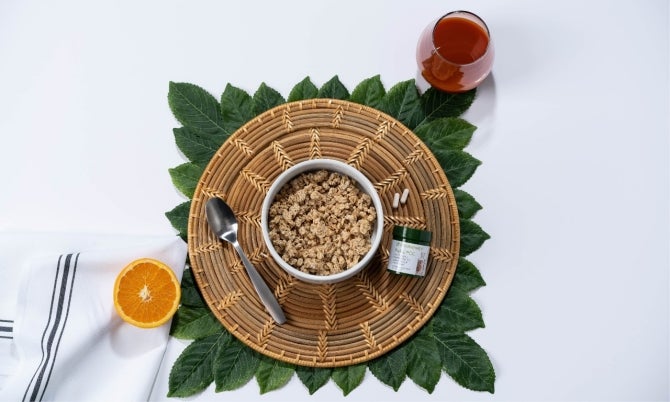Our digestive system is a crucial part of our body's overall health. It acts as a first line of defense against unwanted organisms that enter our body through a number of factors. Bacteria often get a bad reputation for causing illness and spreading disease. However, in reality, many types of bacteria are not harmful, and some are even beneficial.

WHAT DO THEY DO?
The bacteria that lives in our gut does more than you would think. These good bacteria play major roles in the normal functioning of the body1.
Just a few examples of the function of gut bacteria include:
- Metabolizes nutrients from food and certain medications.
- Serves as a protective barrier against intestinal infections.
- Modulate and contribute to gut immune function.
GUT HEALTH
Our gut is lined with about 100 trillion strands of bacteria that harbor more than 1,000 distinct types of strands. They consist of both good and bad bacteria. The types of bacteria within your gut can be affected by diet, age, environment, genes, and medications. When there is an unhealthy balance of bacteria in your system a number of symptoms can arise. These include: an upset stomach, sugar cravings, inconsistent body weight, fatigue, etc. Luckily, there are many solutions to help your gut reach a healthy state.
BALANCING YOUR GOOD BACTERIA
There are several ways to help your gut balance the good bacteria, we will talk about two of them2.
1. What you eat: This means including high-fiber foods and fermented foods.
- High-Fiber Foods: beans, peas, oats, bananas, berries, and asparagus.
- Fermented Foods: yogurt, sauerkraut, miso, kefir, and kimchi.
2. Probiotics: Probiotics come in many forms. One of the most common types is an over-the-counter health supplement. They help provide a healthy balance of good bacteria.
WHAT ARE PROBIOTICS?

Probiotics are generally defined as live microorganisms or “good bacteria”. They are used to help sustain a healthy balance of good bacteria in your body. One of the most common types of probiotics that help promote the growth of beneficial gut bacteria is called Lactobacillus. Pharmanex® uses a unique strand of lactobacillus that can withstand the harsh environment within the intestines.
CHOOSING A PROBIOTIC
There are many different probiotics, and they don’t all have the same properties. By way of example, if a specific kind of Lactobacillus helps with digestive health, it doesn’t mean that another kind of Lactobacillus would have the same effect. So, when Pharmanex started to search for a probiotic strain to use, they wanted to find a unique strain that meets certain desirable characteristics. These include but are not limited to:
- pH Survival (probiotics should survive passage through the acidic nature of the digestive tract)
- Colonization(probiotics should proliferate and colonize in the gut)
- Identity(the identity and concentration of the strain should be stated at the end of shelf life)
- Dosing (delivers a clinically effective dose at the recommended intake)
The search for a probiotic that met these characteristics stopped when they heard about Lactobacillus fermentum PCC. To ensure effective results, clinical studies were done to evaluate the strain of bacteria.
PROBIO PCC RESEARCH

The Lactobacillus fermentum PCC strain, or what we call ProBio PCC, is proven in multiple preclinical and clinical studies. One study tested the ability of this strain to target immune sites called Peyer’s patches more effectively than other strains3. Since much of our immune system is part of our digestive tract, it makes sense that this strain would provide immune benefits—especially considering it colonizes and adheres to related immune sites. Other studies, demonstrating a protective immune benefit, have also been done by evaluating parameters of skin health and respiratory health4-6. The bottom line is not all probiotics are equal. Don’t just take any probiotic, get the right probiotic for you.
BENEFITS OF PROBIO PCC
- Supports a protective immune response.
- Encourages probiotic bacteria in the lower digestive tract.
- Intended for those who experience GI discomfort.
- Can survive the acidic environment of the stomach.
- Resources
- Harvard Medical School. (October, 2016). Can gut bacteria improve your health? https://www.health.harvard.edu/staying-healthy/can-gut-bacteria-improve-your-health
- Dix, Megan. (July, 2018). What’s an unhealthy gut? How gut health affects you. https://www.healthline.com/health/gut-health
- Plant L, Conway PL. Association of Lactobacillus spp with Peyer’s Patches in mice. Clinical and Diagnostic Immunology, 2002; 8(2): 320–324
- Weston S, Halbert A, Richmond P, Prescott SL. Effects of probiotics on atopic dermatitis: a randomised controlled trial. Arch Dis Child. 2005 Sep;90(9):892-7. Epub 2005 Apr 29. PubMed PMID: 15863468; PubMed Central PMCID: PMC1720555.
- West NP, Pyne DB, Cripps AW, Hopkins WG, Eskesen DC, Jairath A, Christophersen CT, Conlon MA, Fricker PA. Lactobacillus fermentum (PCC®) supplementation and gastrointestinal and respiratory-tract illness symptoms: a randomised control trial in athletes. Nutr J. 2011 Apr 11;10:30.
- Cox AJ, Pyne DB, Saunders PU, Fricker PA. Oral administration of the probiotic Lactobacillus fermentum VRI-003 and mucosal immunity in endurance athletes. Br J Sports Med. 2010 Mar;44(4):222-6.